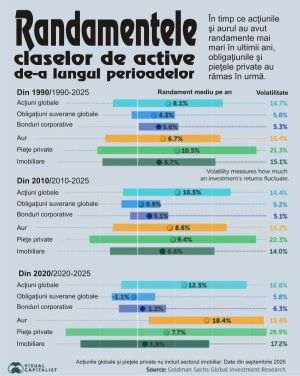The information which was published yesterday on the news streams of some European news agencies according to which several European banks would fail the stress tests represents the beginning of the end for the European banking system, claims economic analyst Ionel Blănculescu.
He said: "If a decision is made to resort to the bail-in in the event of the stress tests, then the confidence in the banking system will be ruined. The statement that several banks could end up in this situation destroys the confidence in the system, which was very low anyway. There are banks that people don't even set foot in anymore. Let's hope that all of these statements are just stories".
Nobody can tell in advance what the results of the stress tests are going to be, says Nicolae Cinteză, the head of the Oversight Department of the National Bank of Romania (NBR).
He told us that the information published yesterday which states that certain European banks will not be able to pass the stress tests can not be confirmed by anybody.
"I am going to find out on Friday night, after 20:00 hours, and on Saturday there will be a teleconference in which the members of the European Banking Authority that have the right to vote will participate. The results will be made public on Sunday night", Mr. Cinteză told us.
Analyst Călin Rechea claims: "The experience of the previous stress tests has caused the authorities to pay particular attention to the new program for assessing the health of the European banking system. This is the last chance to regain the confidence of the markets and of investors. Unfortunately, the evolution of the economies in Eastern Europe since the beginning of the year shows that the hypotheses of the stress test could be far too optimistic. Therefore, the relevance of the speculations concerning the number of financial institutions that failed the test is rather low.
What is important is for the market to think that the results published by the European Central Bank and the European Banking Authority are sufficiently transparent, in order to allow the recapitalization of the banks in an environment that is not affected by panic and contradictory statements from the authorities.
Even in the case of such an optimistic scenario, concerning the reactions to the publication of the stress tests, the hopes in the resumption of the lending process in Europe will not yield any concrete results, because a good capitalization of the banking system is only a necessary condition, but it is not enough. The main problem remains the overleveraging of bank customers, whether it's individuals, companies or governments".
According to the lawyers of Linklaters, the major European banks have raised 34.7 billion Euros this year, 32% more than they did in the 12 months that have preceded the stress tests of 2011, according to Agerpres. Italian banks rank first, with a total of 10.5 billion Euros, followed by the Greek banks - of 3.8 billion Euros, and the German banks - with 6.7 billion Euros.
Linklaters predicts that some banks will fail the ECB tests because only approximately a quarter of the 66 banks which are considered as undercapitalized were successful in raising additional funds this year. However, the lawyers expect the banks that will not pass the ECB tests to be granted a 6-month reprieve to raise new funds or to spin-off assets.
•
Shares of "Erste Group Bank" AG Austria fell 1.2% yesterday, while those of "Alpha Bank" AE in Greece fell 0.8%, and "Eurobank Ergasias" SA were down 2.4%. Shares of "Piraeus Bank" fell almost 4%. In Italy, shares of "Banco Popolare" SC fell 0.9%. On the other hand, the shares of "Monte dei Paschi di Siena" SpA rose 3.8%, and those of "Banca Popolare di Milano" Scarl - rose 1.1%. Shares of "Dexia" SA remained unchanged over the previous day.
•
The ECB will take over the banking oversight activity starting in November 14th, 2014.
•
Sociologist Mirel Palada says: "We shouldn't be causing panic among the population with this kind of news. It's true that we should be concerned with the results that the ECB will see with the stress tests, but not as much as we are trying to be persuaded to. Also, in terms of the physical number of banks, there are 11 of them, according to the news in the press, out of a number of thousands, because it is clear that the ECB has conducted these tests only on banks that it has recorded as troubled. In terms of the capitalization, the effect of these banks running into problems would be minimal, perhaps even residual, and it makes no sense to scare people with such sensationalist news just because the ECB may have found no more than 11 troubled banks.
What happened in Cyprus is not the best example for using in a comparison, because Cyprus was a tax haven and there was no mirroring of the country's economic power. From a financial point of view, Cyprus was completely different. We can't compare it to Europe's financial health.
The 11 banks that may have problems, according to the information in the mass-media would represent approximately 0.1% of the total banks in Europe and, if this percentage were problematic, then that means that 99.9% of the banks are healthy, which means that this a positive, powerful result, a sign of financial European solidity".










































